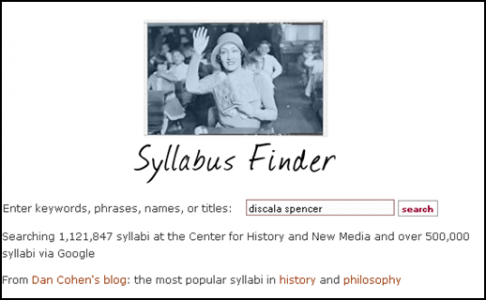Springtime for Software: The Death and Partial Re-Birth of Syllabus Finder

Just weeks before Easter, Dan Cohen's Syllabus Finder--dead since 2009--returned to the net. Sort of. The soul of the popular web tool for education research has transmigrated from its previous incarnation as a search service hosted by George Mason's Center for History and New Media into a new form: a downloadable database comprised of some 1 million syllabi.
Cohen created the Syllabus Finder to work with the Google SOAP Search API back in 2002, and for seven years, the Syllabus Finder's interface put the CHNM web server in touch with the Google web server to answer users' custom syllabus queries by combing the online syllabi of hundreds of educational institutions. Then in 2009, Google deprecated the use of its original API, and the Syllabus Finder was no more--just a sad text box on the CHNM page saying that the Syllabus Finder hoped to return one day re-coded and thanking users, until then, for their patience.
Syllabus Finder, it seemed, had met a fate that is not uncommon among web services--an early forced retirement triggered by compatibility issues. While the web is constantly growing, ever larger and ever deeper, it is also constantly outgrowing formats, versions, and so forth. Thus a web service coded to run with Google's all powerful search winds up with the shelf life of Google's Search API. For Syllabus Finder, that life turned out to be about seven years.
Then on March 30 of this year, an announcement on Cohen's blog made the old news of Syllabus Finder's death if not greatly exaggerated then at least no longer strictly relevant. Syllabus Finder was returning, reborn as the collected results of thousands and thousands of user queries made during the tool's live run. Cohen claims that the Finder actually processed some 1.3 million user requests in its day, so the amassed database is considerable, to say the least, and represents an invaluable data mining opportunity for education researchers interested in big picture pedagogical and bibliographic trends.
Cohen himself has already published an illustrative article using the data set to assess the books assigned in hundreds of American history survey courses, and more interesting studies on how particular subjects were taught in aggregate at the opening of the 21st century are no doubt forthcoming. Kudos to Cohen for recognizing that he was sitting on a mountain of data that was, in fact, a fascinating object of investigation and moreover, for making all of that data publicly available. Google may have left Syllabus Finder behind, but Cohen has given the old program a creative and exciting second life.